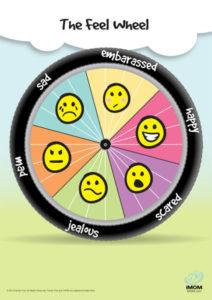There are times I can be so patient with my children, “You can’t find your school uniform? No problem.” “You spilled your milk, left towels on the bathroom floor, and accidentally hit your sister? We all make mistakes.” But as Dr. Scott Turansky says, “A child with a negative, complaining attitude can wear down even the best moms.” Yep, when my kids whine my patience goes out the window. Unfortunately, most children have this secret weapon at the ready any time they want to get under our skin or get their way. We will do just about anything to get them to stop whining… now!
And while our immediate reaction to get them to stop might be to whine right back and tell them to “cut out the whining,” that won’t help in the long run. Here are six things that will really help you stop the whining and the complaining in your house.
Identify Emotions

Mom: Gracie, it’s time to clean up your toys.
Gracie: I caaaan’t! (Throwing herself on the floor) It’s too much for me to do, Mom! I don’t want to!
Mom: OK, I know you’re tired, and you can tell me how you feel, but you need to speak respectfully. Even if you’re tired or upset, try to stay calm.
Identify Influences
Try to identify where some of your child’s bad attitudes are coming from. For example, one father noticed his son’s frustration worsened after playing video games. After limiting the child’s computer time, he saw an improvement in attitude. Perhaps your child is mimicking the behavior of someone else—a parent, sibling, friend or even TV character—who complains or criticizes.
Point Out Attitudes
Turansky and Miller say, “Identifying a thinking error that needs to change may be a new revelation for children who are stuck in a bad attitude. They may be responding to a situation only on an emotional level. You can offer the insight of an objective outsider.”
For example, if your child had a bad day at school but then takes it out on his brother, he may be overwhelmed emotionally and needs help in how to properly handle those emotions. Target more than the behavior, look deeper to see what’s causing the trouble.
Challenge Attitudes
If your child is complaining about doing his chores or homework, offer him motivation to change his attitude.
Mom: Son, how’s your homework coming?
Son: It stinks. Why do I have to do it anyway?
Mom: Listen, that attitude will just make your work harder. You know that a lot of your grade comes from homework. You want to do well and your Dad and I want you to do well. So, try to change your attitude.
You can do it. How about this. Work hard for the next hour, and then you can take a break. We’ll get you some ice cream.
Hopefully, the real reward of accomplishing something will be what motivates a change in attitude.
Teach Responses
If your child automatically responds to discipline or disappointment with whining or complaining, then teach him how to properly react. For example, a child’s appropriate response to not getting to stay up late might be, “Maybe next time” or simply, “OK.” Tell your children to obey first, and then you’ll listen to what they have to say. Another important lesson is teaching a child to ask for something using “please” instead of demanding what he wants.
Affirm Progress
When you notice your child making improvements, praise him and let him know you’re proud.
Mom: Jake, you did a great job cleaning your room. I can’t believe you did it all so quickly. I’m going to tell your Dad about it.
Even if you are tempted, refrain from comments such as, “It’s about time!” Instead, encourage him in his progress and keep the focus positive.
Turansky and Miller summarize dealing with a complaining child with this: “Attitudes are windows into a child’s heart. If you help your children learn to adjust attitudes, they will have the skills necessary to develop healthy perspectives about life’s challenges and struggles as they get older.”
How do you handle whining and complaining in your home?
Source: Good and Angry: Exchanging Frustration for Character in You and Your Kids! by Scott Turansky and Joanne Miller
Dr. Scott Turansky is an author and speaker known for his heartfelt parenting approach. He offers moms practical, real-life advice for many of parenting’s greatest challenges and is the founder of the National Center for Biblical Parenting.










